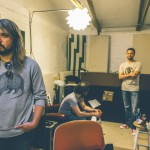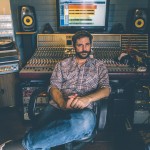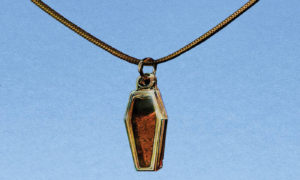In 2003, two years after I moved to Austin, when SXSW was a much smaller affair and Emo’s still occupied real estate on Red River, a Seattle based indie label called Barsuk held a day party at the esteemed venue during the March festival. On the bill were The Long Winters, Andrew Kinney of the American Analog Set, Quasi, Britt Daniel of Spoon, Jesse Sykes, Zykos, Western Keys, Pinback, and headliners Death Cab for Cutie. I was a huge fan of many of these bands and made sure to arrive at the party when doors opened at noon. I was the first one there, and I dutifully watched every band from near the stage. Death Cab, having already begun their ascent into stardom, eventually ensured that the room filled completely before their set. Being sweaty and exhausted didn’t stop me from staying front and center, elbows rested on the wooden stage. When Death Cab frontman Ben Gibbard emerged I remember clearly being enamored with his all-black Converse, which were about eye-level for me. They were so cool. Everyone wore the traditional black and white Chuck Taylor’s, but I’d never seen the all-black versions. Without a doubt, Converse has a long history with the with artists and musicians.
This SXSW, as with several before, Converse is bringing their recording studio, Converse Rubber Tracks, to Austin. Or more accurately, they’re bringing the spirit of their recording studio to Austin. After welcoming bands to submit their music for consideration, Converse chose twenty Texas bands to record in two Austin studios (Big Orange and Shine Studios, both in East Austin) at no cost. On the day I visited the studios, Denton rock band Birds of Night had just finished tracking a song. The four band members listened to the song on the playback and grooved to the crunchy guitars and driving rhythm.
However, the bands aren’t limited to recording, as artists are allowed to use the studio time however they desire. In the case of Austin band Good Field, the indie pop quartet was able to master their new album. Rather than requiring bands to make a song that can then be plugged by Converse, the company truly affords artists an opportunity to make the time beneficial. “To be able to get a song recorded and/or mixed or mastered really does help,” says Good Field keyboardist Kyle Robertson. Drummer Esteban Cruz adds, “A lot of people record themselves, which is what we’ve been doing for a long time. Just having access to a nice studio we otherwise wouldn’t have is great.”
Good Field was able not only to master their album but to use an engineer they knew, Justin Douglas. Douglas owns Shine Studios and has worked with the Rubber Tracks program for several years and says that the program is “well thought out and really well done,” before adding, “and I’m not saying that for the shoes.” The silent thinker of the band, bassist Michael McCleod eloquently says, “I just want to say thanks to Converse, because it is really special that they offer the opportunity to work on what the band sees fit and what would best help them, so rather than us working up a song, we have our minds wrapped around finishing an album. I think it’s an immense gift to be able to pump out this recording during South By. It’s cool.”
Unmistakably, the Converse Rubber Tracks program helps to promote Converse’s brand and reputation–there’s an element of advertising. But it’s also a refreshing perspective on the potential for relationships between artists and companies. Rubber Tracks clearly goes beyond advertising and product placement. Rather than cramming their product down artists’ throats while showing off for the public (ahem, McDonald’s we’re looking in your direction), Converse gives artists something valuable and precious and lets them have complete control. You won’t find a horde of people watching the bands record; the program has little to do with public posturing and everything to do with genuinely fostering good will with artists. Rather than exploiting artists, the program equally considers the company and the bands with whom they work. Those who know me can confirm you’d have a difficult task finding someone more critical of the seedy deeds of corporate entities, but Converse has impressed me by bolstering the careers of almost two dozen Texas bands. In that regard, Converse and Pop Press International are on the same mission.
All photographs © Bryan C. Parker & Pop Press International; click any image to open set in slideshow viewer.




























